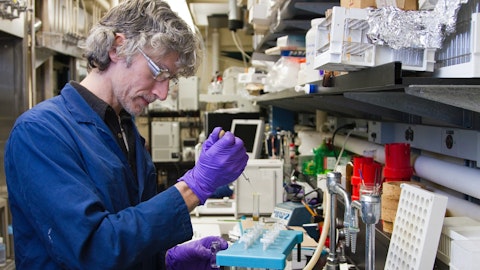There’s going to be a lot of consideration and thinking between here and there. And so we may change that, but it’s also perhaps worth saying that at some point, I think it would be advantageous to find a large and highly enabled partner to accelerate clinical development because this is a molecule that would have potential in a variety of different classes and something that probably is done best by a big company. So that would be our current feeling right now in terms of subsequent steps. But as I said, the priority right now is to get this through to clinical development and to get that early proof of concept.
Andrea Tan: Perfect. And maybe a follow-up there. Can you just remind us of your willingness to advance these programs on your own, I guess, maybe the extent to which you would bring them through clinical development.
Carl Hansen: Sure. Happy to address that. This is a question that I get a lot, and it’s often framed as — what is your strategy for internal programs? My response to this is normally that it’s wrong to think of a single strategy for internal programs. Every program needs to be considered on its own merits. Every program will have different time lines, different costs, different operational challenges and clinical development. And of course, as things progress, there’ll be different priorities in the company and capital allocation and different strategic opportunities. The way we think about it is that right now, we have committed to bring ABCL635 and ABCL575 through to the end of Phase I. It’s possible that could get intercepted with the right business opportunity, but we are full steam ahead to do that.
After we get to that point, we will evaluate the risk/reward and do what’s best for the business and where we think we’re going to get the best return on investment. And I would not take it off the table that we would advance one into further trials, if we thought that, that was the best path.
Andrew Booth : And just, Andrea, if I can add there as well, this is Andrew speaking, the announcement we had earlier in the year about receiving some government funding allow us to move molecules. That included funding molecules that we would advance into Phase I and received some significant amount of government funding that make it quite capital efficient for us to do that. So this is completely consistent with that announcement and that strategy.
Operator: The next question will be from the line of Stephen Willey with Stifel.
Stephen Willey: And congrats on procuring the Ox40 ligand antibody. I think it’s interesting that you said both been birthed by antibody platform discovery companies. I guess with respect to the Prelude deal, can you just talk a little bit about what you think makes a good antibody for the purposes of delivering a degrader. I guess do you want to have the same level of high internalization that you sometimes see on some more kind of chemo conventional ADCs? Or is there a different kind of chemical angle that you want to take here? And just given that I think the degrader that they’re hoping to administer here this market to, which is, I think, relevant in SMARCA4 efficient tumors is probably relevant across a variety of different tumor types requiring a variety of different target antigens.
Does this collaboration contemplate the notion that you could develop multiple antibody scaffolds that are targeted towards a specific tumor type, and then they can just kind of cut and paste their version of a SMARCA2 degrader on top of that?
Carl Hansen: Great questions. Let me start by saying that we’re excited about the collaboration. We have emphasized our focus on strategic partnerships. This one is certainly a 5-star strategic partnership in that we have two teams that are very experienced and have deep expertise on two sides of the molecule that you need, the small molecule development and the antibody development coming together to enable what we think will be an exciting new class of antibody conjugates. The first program, as you rightly pointed out, is an antibody conjugate for a degrader. It will be related to SMARCA. I think that may have even been mentioned in the press release. The question about what exactly do you want an antibody to do to be effective.




